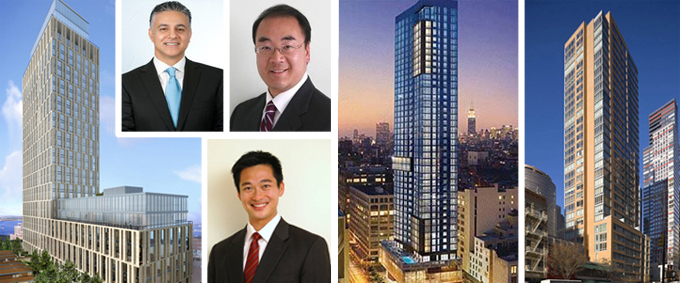
From left: 101 Warren Street, Asher Alcobi of Peter Ashe Real Estate and Michael Chen of Bond New York (top), Wei Min Tan of Castle Avenue Partners (bottom), Trump Soho, and 250 East 53rd Street
Now added to the long list of exports from China are buyers of New York City real
estate.
Chinese residents flush with cash from the Asian nation’s booming economy, and in
some cases limited in what they can buy at home, are starting to look at Manhattan
apartments.
Between March 2010 and March 2011, 9 percent of foreign buyers in the U.S. were from
China, according to the National Association of Realtors, up from 5 percent in 2007.
Canada sends the U.S. the most foreign buyers, with 23 percent, but China is number
two, the data shows. In contrast, England, Mexico and India, next on the list, each
represent 7 percent.
And many of those Chinese buyers are trickling into New York, say brokers, who are
creating customized services to greet them.
“They come, they look, they find, they sign, they go,” said Asher Alcobi, president of
Peter Ashe Real Estate, a firm that is representing about a
half-dozen Chinese buyers, up from two of them five years ago.
And that uptick has largely happened this year, after the Chinese government issued
restrictions about buying vacation homes in that country, Alcobi said.
But there may be simpler drivers, too.
A Chinese couple recently bought a condo in Trump Soho New York — a high-rise from
a developer whose brand is well-liked in many parts of Asia, Alcobi explained — because
they wanted to be close to their son, who is a sophomore at Boston University. The unit,
which will be used for two-week stays, cost about $1 million, he added.
Not all condos will do. Chinese buyers are sensitive about certain numbers, said Alcobi,
who won’t show them fourth-floor units, though ones on the eighth floor are desirable. So
are street addresses that add up to eight, like, say, “44.”
Certain spatial feng shui elements are also key. Chinese buyers tend not to like long corridors
and narrow stairs, or views of chimneys with smoke, he said.
Also, new construction is far preferable to older buildings, perhaps because the older
apartments in China aren’t known for being well-constructed, said Wei Min Tan, a
broker with Castle Avenue Partners, which is a group within Manhattan-based Charles
Rutenberg with 10 Chinese clients, up from none two years ago.
Tan is now putting the finishing touches on a Chinese language Web page, like the one
that Bond New York created in April.
Plus, two of the five members of Tan’s team, including Tan himself, speak
Mandarin. “Culturally, newer is better,” said Tan, who shows condos like 101 Warren
Street, in Tribeca, and the Veneto, at 250 East 53rd Street.
And units here may seem like a bargain. Overspeculation in Hong Kong, which had been
a popular draw for wealthy Chinese buyers, is now pushing prices through the roof, Tan
said; new one-bedroom condos there can cost $2,500 a foot, as compared with $1,500 a
foot in New York.
And despite the well-known legions of working-class Chinese, there are many newly
minted upper-class millionaires in the country. “That’s also why you see a lot of high-end
wine auctions in Hong Kong, and art auctions,” Tan said. “There are a lot of people who
can bid up things.”
But there may not be a flood of Chinese buyers just yet. Broker Michael Chen, the
director of the Asian market development for Bond, would not divulge the number of his
Asian clients, saying only that “I am experiencing steady growth.”
And he does not expect to see the Corcorans and the Prudential Douglas Ellimans of the
real estate world add Chinese Web pages, like Bond has, any time soon. “It’s just not big
enough for them yet,” he said. Corcoran and Elliman weren’t immediately available for
comment.